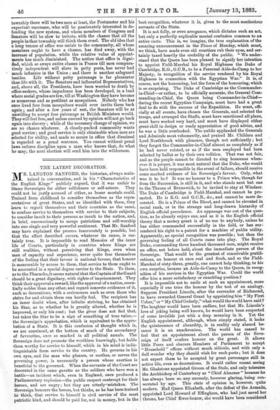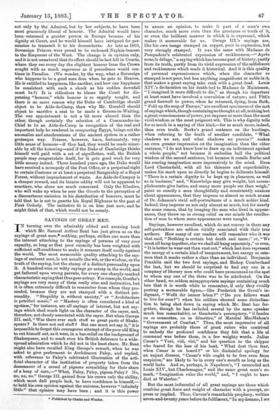THE LATEST DECORATION.
MR. LANGTON SANFORD, the historian, always main- tained in conversation, and in his ." Characteristics of the English Kings" publicly argued, that it was unfair to blame Sovereigns for either selfishness or self-esteem. They could not be justly accused of either, as lesser mortals could. Trained from childhood to consider themselves as the repre- sentatives of great States, and as identified with them, they learn to regard themselves and their countries as the same, to confuse service to themselves with service to their subjects, to consider insult to their persons as insult to the nation, and, in brief, unconsciously to merge patriotism and self-worship into one single and very powerful sentiment. That Mr. Sanford may have explained the process inaccurately is possible, but that the effect described occurs, whatever its cause, is cer- tainly true. It is impossible to read Memoirs of the inner life of Courts, particularly in countries where Kings are still realities, without perceiving that Kings, even when men of capacity and experience, never quite free themselves of the feeling that their favour is national favour, that honour is measurable by access to them, that service to them ought to be accounted in a special degree service to the State. To them, as to the Pharaohs, it seems natural that the Captain of the Guard should be a great dignitary, with rights of imprisonment. They think their approval a reward, like the approval of a nation, essen- tially nobler than any other, and regard concrete evidences of it, such as decorations, with a seriousness such as even those who strive for and obtain them can hardly feel. The recipient has an inner doubt when, after infinite striving, he has obtained his Star, as to whether he is greatly altered, whether he is improved, or only his coat; but the giver does not feel that, but takes the Star to be a sign of something of true value,— the Sovereign's approbation, which is equivalent to the appro- bation of a State. It is this confusion of thought which is, we are convinced, at the bottom of much of the ascendancy of favourites, once so marked in all political annals. The Sovereign does not promote the worthless knowingly, but holds them worthy for service to himself, whIch in his mind is indis- tinguishable from service to the country. He governs in his own eyes, and the man who pleases, or soothes, or serves the governing power, is necessarily a person whose exertion is beneficial to the governed. When the servants of the Court are decorated in the same gazette as the soldiers who have won a battle—an incident which, even in England, once produced a Parliamentary explosion—the public suspect contempt for their heroes, and are angry ; but they are utterly-mistaken. The Sovereign honours the heroes, but thinks, as he has been trained to think, that service to himself is civil service of the most patriotic kind, and should be paid for, nut in money, but in the best recognition, whatever it is, given to the most meritorious servants of the State.
It is not folly, or even arrogance, which dictates such an act, but only a perfectly explicable mental confusion common to an entire caste. This is, we imagine, the true explanation of the amazing announcement in the Times of Monday, which must, we think, have made even old courtiers rub their eyes, and cer- tainly taxed heavily the credulity of the public. " We under- stand that the Queen has been pleased to signify her intention to appoint Field-Marshal his Royal Highness the Duke of Cambridge, K.G., G.C.B., to be a Personal Aide-de-Camp to her Majesty, in recognition of the service rendered by his Royal Highness in connection with the Egyptian War." It is, of course, not the honouring, but the form of the honouring, which is so surprising. The Duke of Cambridge as the Commander- in-Chief--or rather, to be officially accurate, the General Com- manding-in-Chief, the Queen being Commander-in-Chief- during the recent Egyptian Campaign, must have had a great deal to do with the success of the Expedition. He must, offi.- cially at all events, have chosen the Generals, and selected the troops, and arranged the Staffs, must have sanctioned all plans, must have worked very hard, and must have displayed either great skill in design or ready appreciation of good advice, and he was a little overlooked. The public applauded the Generals and Admirals most vehemently, and praised Mr. Childers and Lord Northbrook with pleasure, though not sufficiently ; but they forgot the Commander-in-Chief almost as completely as if he had never existed, or as if the men employed had been selected by ballot or by their own volition. That was not fair, and as the people cannot be directed to sing hosannas when- ever it is proper, it was most natural that the Duke, who would have been held responsible in the event of failure, should receive some marked evidence of his Sovereign's favour. Only, what was it to be P It was no honour to a Prince who, though far from the Succession, is still in it, and who stands next but one to the.Throne of Brunswick, to be invited to stay at Windsor. The Duke of Cambridge is Field-Marshal, and cannot be pro- moted. He is K.G. and G.C.B., &c., and cannot be more de- corated. He is a Prince of the Blood, and cannot be elevated in social rank, or in the strange and long-drawn hierarchy of English official precedence. An appanage was out of the ques- tion, as he already enjoys one, and as it is the English official theory that a money grant is of no use to anybody, unless he has either commanded successfully in the field, or has sur- rendered his right to a patent for a machine of public utility. Apparently, no special recognition was possible ; but then the governing feeling of all Courts came into play. The Royal Duke, commanding three hundred thousand men, might receive an office, not before held, about the immediate person of the Sovereign. That would be the greatest of conceivable gratifi- cations, an honour at once real and fresh, and so the Field- Marshal of sixty-three, greatly, one cannot help thinking, to his own surprise, became an Aide-de-Camp to the Queen, in recog- nition of his services in the Egyptian War. Could the world offer him a more satisfactory or ennobling position P It is impossible not to smile at such an appointment, more especially if one tries the honour by the test of an analogy. Suppose President Lincoln, after the surrender of Richmond, to have rewarded General Grant by appointing him " My First Usher," or " My Chief Orderly," what would the world have said ? The laughter would have been endless, but that Mr. Lincoln's love of joking being well known, he would have been suspected. of some invisible jest with a deep meaning in it. Yet the English appointment, although, when simply stated, it looks the quintessence of absurdity, is in reality only absurd be- cause it is an anachronism. The world has ceased to feel that an appointment about the person of the Sove- reign of itself confers honour on the great. It allows little Peers and obscure Members of Parliament to accept "Household" offices without much ridicule, and with only a dull wonder why they should wish for such posts; but it does not expect them to be accepted by great personages still in active life, even as decorations. It would rather resent seeing Mr. Gladstone appointed Groom of the Stole, and only tolerates the Archbishop of Canterbury as " Chief Almoner " because he has always been so, any anomaly, however glaring, being con- secrated by age. This state of opinion is, however, quite modern. Had Queen Elizabeth, after the defeat of the Armada, appointed Lord Howard of Effingham, who had just saved her throne, her Chief Ewer-bearer, she would have been considered not only by the* Admiral, but by her subjects, to have been most graciously liberal of honour. The Admiral would have been • esteemed a greater person in Europe because of his dignity at Court, and he would himself have intrigued for per- mission to transmit it to his descendants. As late as 1803, Sovereign Princes were proud to be reckoned Napkin-bearers to the Emperors of the West. The change is in opinion only, and it is not unnatural that its effect should be last felt in Courts, where they see every day the slightest honour from the Crown sought with as much eagerness as if precedence would con- tinue in Paradise. (We wonder, by the way, what a Sovereign who happens to be a good. man does when he gets to Heaven. He ii entitled to happiness, like another, and how can happiness be consistent with such a shock as his sudden downfall must be P) It is ridiculous to blame the Court for dis- pensing "honour," while honour is so eagerly sought, and there is no more reason why the Duke of Cambridge should object to be Aide-de-Camp, than why Mr. Grenfell should object to sacrifice a seat to be made a Groom-in-Waiting. The one appointment is not a bit more absurd than the other, though certainly the selection of a Commander-in- Chief to be an Aide-de-Camp in recognition of the real and important help he rendered in conquering Egypt, brings out the anomalies and anachronisms of the ancient system in a rather grotesque way. Princes, however, have, fortunately, very little sense of humour—if they had, they would be made miser- able by all the kotowing—and if the Duke of Cambridge thinks himself well paid with a set of aiguillettes, well, the British people may congratulate itself, for it gets good work for very little money indeed. Three hundred years ago, the Duke would have received a monopoly of the Post Office, or a perpetual right to certain Customs or at least a perpetual Rangership of a Royal Forest, without impeachment of waste. An Aide-de-Campcy is a cheaper reward, and its bizarre oddity will not be apparent to courtiers, who alone are much concerned. Only the Khedive, who will wake up when he sees the Gazette to the perception of a discourteous omission in his distribution of honours, must be told that he is not to gazette his Royal Highness to the post of First Orderly. The imitative fit is on him just now, and he _might think of that, which would not be seemly.



































 Previous page
Previous page